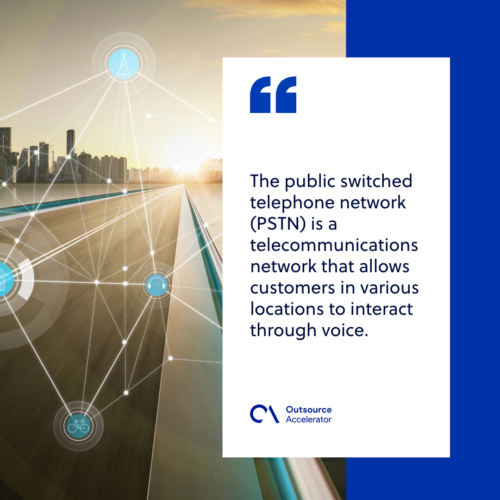Public switched telephone network (PSTN)
Definition
What is a public switched telephone network (PSTN)?
The public switched telephone network (PSTN) is a telecommunications network that allows customers in various locations to interact through voice. It is the classic circuit-switched telephone network, which has been widely used since the late 1800s.
For centuries, this legacy technology has used underground copper cables to offer companies and homes a dependable way of communicating and is still widely recognized as a standard mode of communication.

How does a public switched telephone network work?
The public switched telephone network operates by hardwiring underground copper lines from homes and businesses to switching centers, where phone calls are connected. PSTN forwards your incoming calls from your phone to the recipient’s phone.
What are the advantages of a public switched telephone network?
Here are some of the advantages of using a public switched telephone network for your business:
Proven reliability
The public switched telephone network has been around for a long period, and the technology and infrastructure have been almost perfect.
As opposed to online communication tools or computers, your company’s communication capabilities will not be disrupted by power outages or internet failures.
Better security
The public switched telephone network’s security is another area where it excels. PSTN is mostly based on analog lines and is not as vulnerable to cyber threats as VoIP.
PSTN lines provide the convenience of use that is often lost with modern communication solutions.
Easy to use and set up
Users simply require a line connected to their house to be connected to the PSTN. This link is already present in the majority of residences. Users don’t need to acquire a VoIP modem to connect their phones and make and receive calls.
VoIP as an alternative to PSTN
Businesses have been transitioning from PSTN lines to VoIP over the last decade. Here’s what you need to know if you’re wondering whether a public switched telephone network (PSTN) or voice over internet protocol (VoIP) is the best choice for your company.
Cost
While PSTN lines will probably cost your organization higher, VoIP can save you in expenses since it uses your existing internet connection to place and receive calls.
Connectivity
With a PSTN line, you won’t have to be anxious about power shortages or weak internet connections interfering with call quality. However, you can only engage in calls where the PSTN line is installed such as in your workplace.
A VoIP, on the other hand, enables you to communicate with your consumers from any location that has an internet connection.
Capability
PSTN is limited to voice communication. However, you can incorporate video conferencing, call records, and other features in VoIP.
Security
VoIP and PSTN are both safe and secure. However, PSTN lines are less vulnerable to cyber threats due to their physical characteristics. Security will not be an issue with either choice, nonetheless.







 Independent
Independent




